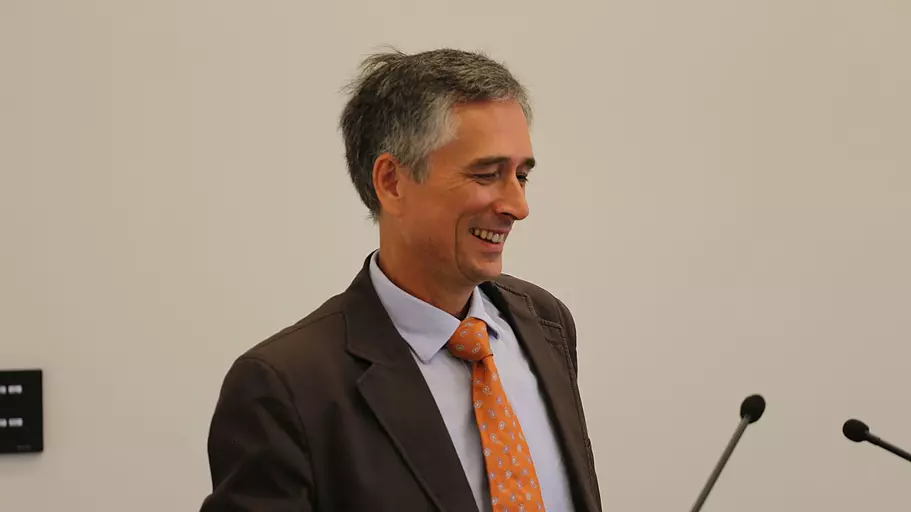Old Testament scholars at war over gender in Bible
Old Testament scholar: Only two genders have a plausible theological basis
Does Genesis only know men and women - or a diversity of genders? Old Testament experts are debating this controversially: The Viennese exegete Schwienhorst-Schönberger turns against his colleague from Mainz - and thus supports Nuncio Eterović.
The Viennese Old Testament scholar emeritus Ludger Schwienhorst-Schönberger supports nuncio Nikola Eterović in the debate about the church's gender image. The interpretation of the story of creation that an image of humanity based on exactly two different genders is represented is plausible and is also represented in this way in current theological science, Schwienhorst-Schönberger wrote on Facebook on Tuesday. The Mainz Old Testament scholar Thomas Hieke took a clear stance against Eterović in interviews on katholisch.de and on Deutschlandfunk (DLF). With his remarks, Schwienhorst-Schönberger responds to Hieke: The question raised in the DLF interview as to how it could be that theologians had misunderstood the story of creation for over 2,000 years and that Roman theologians still do so today can only be: "Because that the meaning of the biblical text is."
Schwienhorst-Schönberger shares Hieke's position that the change to Gen 1:27 in the revised standard translation of 2016 is correct. There it is no longer said that God created man “male and female”. Instead, the verse now reads: "Male and female he created them." The Viennese biblical scholar also emphasizes that the standard translation is correct. "The reason for the revision, however, is not due to the findings of gender theory, but is in line with the source language-oriented revision of the standard translation": The original Hebrew text does not contain the nouns "man" and "woman" ("ish" and "ischah") , but rather the adjectives “male” and “female” (“zakar” and “neqebah”), says Schwienhorst-Schönberger. However, this does not change the overall understanding; in the second creation account, this is clearly interpreted "in the sense of the binary gender constellation of 'ish' and 'ischah', i.e.: 'man and woman'," the Viennese Old Testament scholar continued. "That the biblical interpretation of the teaching office of the Catholic Church and that of the nuncio contradict the latest biblical scholarship, as Hieke claims, is misleading," he emphasizes.
Schwienhorst-Schönberger was surprised that Hieke advocated a clarity in his interpretation of the creation story "that reveals almost fanatical traits" instead of assuming that biblical texts are open to meaning: "The least that can be said is that the relevant biblical ones "Texts contain a potential for meaning within which the official position of the Catholic Church can be viewed as very plausible. So it has not read the biblical text 'against the grain'."
Overcoming the traditional family as the goal of queer theory
Unlike Hieke, Schwienhorst-Schönberger also sees a threat to the traditional family from gender theories as plausible. This can also be read in the literature from the queer movement itself, where, with reference to critical and Marxist theory, the abolition of the family is advocated and the aim is to "overcome a hegemonic heteronormative matrix in all areas of society": "You will The church shouldn't be resented if it pursues other goals and can come up with good arguments for them."
Ludger Schwienhorst-Schönberger was a university professor for Old Testament Biblical Studies at the University of Vienna until his retirement in 2022. In 2021 he was awarded the Joseph Ratzinger Prize. The German is considered one of the leading experts on the wisdom books of the Bible and the Old Testament "Song of Songs". In the debate about the blessing of same-sex couples, he spoke out against a justification from the Bible. As an expert in the sedition trial against the Bremen pastor Olaf Latzel, he saw his positions on homosexuality and transsexuality as being backed by the Bible.
Last week, the address by Apostolic Nuncio Nikola Eterović at the opening of the Plenary Assembly of the German Bishops' Conference (DBK) caused debate. Eterović had complained that the biblical image of man had meanwhile been forgotten even in some circles of the Church, while a deviating, "partly even contrary image of man and his nature" was gaining ground. The Nuncio developed the image of man from the biblical account of creation. The statement met with sharp opposition from the Vicar General of Essen, Klaus Pfeffer, who spoke of a hurtful attack. The DBK president, Bishop Georg Bätzing, responded to Eterović in the final press conference of the plenary assembly. According to Bätzing, the bishops pointed out to the nuncio in a debate "that both new findings of the life sciences and social insights had to be integrated into the hitherto dominant classical perspectives in order to be able to reach people today". The "hard language images" used by him were not suitable to remain capable of conversation in a changing fellow world. The bishops had also declared themselves in this sense in the Synodal Assembly.










.jpeg)

Comments